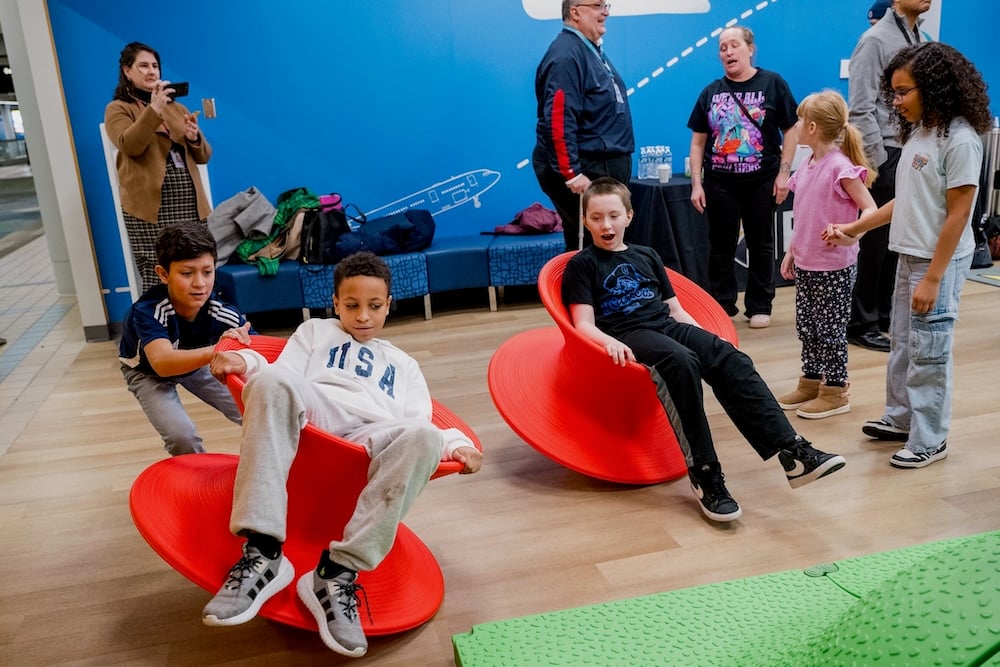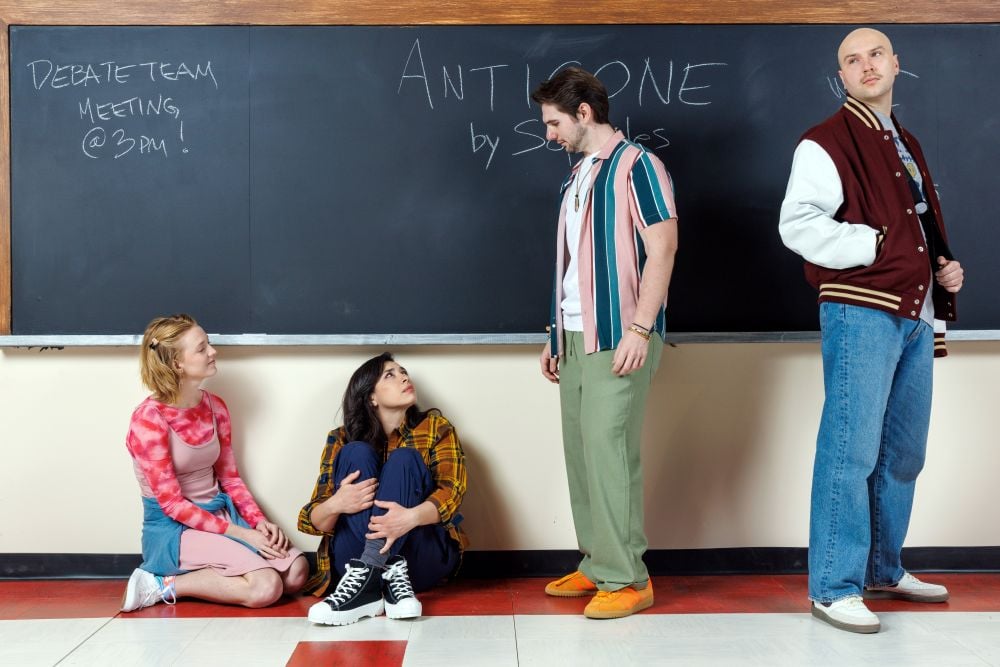How Prime Stage Theatre Has Brought Authenticity to ‘The Miracle Worker’
The story of Helen Keller and the play’s presentation also highlights the connection the famous educator and advocate had with Pittsburgh.

MARYJEAN SHAHEN, (MIDDLE), ADVISES ACTORS HOLLAND ADELE TAYLOR AS ANNIE SULLIVAN (LEFT) AND KENDALL KNOTTS AS HELEN KELLER (RIGHT) IN THE PROPER SIGN LANGUAGE MOVEMENTS. | PHOTO BY CONNIE BRINDA
One local theater is hoping to bring more awareness to the Deaf and Deafblind community. Its latest production depicts the childhood story of Helen Keller, one of the most well-known Deafblind individuals of all time, who also has a connection to Pittsburgh.
Prime Stage Theatre is showing “The Miracle Worker,” by William Gibson at the New Hazlett Theater on the North Side; its last performances are this weekend, Friday, Nov. 10 through Sunday, Nov. 12. The play tells the story of the Deafblind advocate, educator and author as a child and her teacher Annie Sullivan, who helped her learn to communicate and connect with the world.
Artistic director Wayne Brinda believed it was important that the production collaborate with Deaf consultants to ensure authenticity and accuracy in their portrayals of Helen Keller, as well as Deaf and Deafblind people more generally.
Maryjean Shahen, a Deaf professor at Community College of Allegheny County and ASL Poet Laureate of Allegheny County, worked with the director and actors to bring that necessary perspective.
“Deaf community leaders represent the Deaf community authentically,” says Shahen, “which provides encouragement for future opportunities and enlightens others in a way that the hearing community cannot.” Deaf people have a deeper understanding of their needs for accessibility, visual language and human rights.
The communication gap is intimidating, but Shahen urges hearing people to access available resources “to bridge those gaps with tactile sign/pro-tactile, assistive technology, and transportation,” she says. Take up an American Sign Language class or learn to tactile sign. Attend Deaf and Deafblind community events. Support the community through donations or sponsors.
“We are human,” says Shahen. “We deserve everything that other communities already have at their disposal.”
She even notes that within the Deaf community is the even smaller, overlooked population of Deafblind people. Productions are responsible for consulting with and casting Deaf and Deafblind actors, advocates and organizations such as Silent Visual Media and National Theatre of the Deaf to accurately represent these underrepresented populations in productions like “The Miracle Worker.” The production teamed up with the Helen Keller National Center for DeafBlind Youth and Adults to ensure an added layer of authenticity.
“Don’t give up in finding Deaf and Deafblind talent to represent your production,” says Shahen. “There are many skilled consultants all over the world and it is now easier to access people everywhere with technology.”
Brinda believes that Shahen played a crucial role in the production’s authenticity, accuracy and respect for the Deaf and Deafblind community.
“I think without MJ, it would be very difficult,” says Brinda. “I would be worried that it would just be stereotyped, and I did not want that. I wanted it to be real, and I wanted it to be true to Helen Keller and also true to those with disabilities.”
Shahen brought a whole new insight to the Deaf experience, pointing out specific mannerisms that would have otherwise been omitted.
During the play, there will be times where no verbal communication is used, and here, it is where the audience can step into Keller’s world.
In one of the scenes where Kendall Knotts, the actress portraying Helen Keller, touches the water, she has a sort of “pullback,” sensation. “Having those sensitivities are really important,” says Brinda, who explained that in their research they found just how keen Keller’s other senses were and that she could perceive the atmosphere just by walking into a room.
While no Deaf children auditioned for the role, Knotts has had past experience working with Deaf people and learning ASL.
Brinda wants people to take away from the production the importance of teachers and the sheer impact they can leave on the lives of their students. And while the play depicts Keller as a child, he wants to bring awareness to the achievements she made later on in life, as an author and activist who inspired others and “lived an amazing life.”
After one of last weekend’s performances, Gary Rogers, president of the Oakmont Historical Society, discussed with the audience some historical context for the production and Pittsburgh’s direct connection to Helen Keller.
Rogers explains in an interview that Keller was a frequent visitor to Pittsburgh in the 1890s and early 1900s. During this time, she befriended William Wade, a wealthy industrial entrepreneur and philanthropist who lived in Oakmont and had a particular interest in helping children, especially blind and Deaf children and those with other special needs. He also helped fund Keller’s education.
“He bought a lot of books and Braille machines and those types of things for other blind and hearing-impaired children,” Rogers says.
As a local historian, Rogers believes in the importance of portraying history accurately. He also believes that forming personal connections to history can transform the way we interact with it.
“So often we study history, but we aren’t aware of the local connection to that history,” he says, remarking that he never learned about Keller’s connection to Pittsburgh in school, and that instead heard about it through stories passed down from his family.
Rogers, whose family has lived in Oakmont for many generations, has his own personal connection to Keller. His great grandfather worked on Wade’s estates, where he befriended her during her visits, taking her horseback riding, which was something she liked to do.
Keller, born in Tuscumbia, Alabama, became Deaf and Blind after a brief illness at 19 months old. Because of her accomplishments and impact on education and the Deafblind community, she was named one of Time Magazine’s 100 Most Important People of the 20th century. Keller died on June 1, 1968 at age 87.
“She was such an important person, and if you went around and asked most people in Oakmont, they wouldn’t have known she was here.”
This weekend there will be a sensory-inclusive performance on Saturday, Nov. 11 at 2:30 and the 2:30 show on Sunday will have audio description, signed interpretations and live captions.











